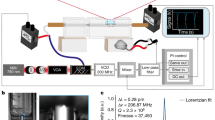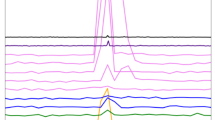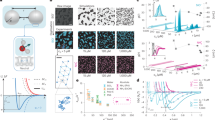Abstract
THE collision broadening of the inversion spectrum of ammonia has been studied by Bleaney and Penrose1 at pressures up to 600 mm. mercury. The line-widths, measured at a pressure of 0·5 mm. mercury, give values for the collision diameters (for self-broadening) varying between 8·7 A. and 14·2 A., with a mean value (weighted according to the line strengths) of 13·2 A. Between 0·5 mm. and 100 mm. pressure, the shape of the absorption curve agrees closely with that calculated from the intensity and position of the individual lines, assuming that their widths vary linearly with the pressure. At 600 mm. pressure, however, the absorption maximum has shifted to less than 0·6 cm.-1, and the curve shape is no longer consistent with that calculated from the structure factor of Van Vleck and Weisskopf2, and Fröhlich3, using the extrapolated line-widths.
This is a preview of subscription content, access via your institution
Access options
Subscribe to this journal
Receive 51 print issues and online access
$199.00 per year
only $3.90 per issue
Buy this article
- Purchase on Springer Link
- Instant access to full article PDF
Prices may be subject to local taxes which are calculated during checkout
Similar content being viewed by others
References
Bleaney and Penrose, Proc. Phys. Soc., 59, 418 (1947).
Van Vleck and Weisskopf, Rev. Mod. Phys., 17, 227 (1945).
Fröhlich, Nature, 157, 478 (1946).
Bleaney and Penrose, Proc. Roy. Soc., A, 189, 358 (1947).
Bleaney, Loubser and Penrose, Proc. Phys. Soc., 59, 185 (1947).
Author information
Authors and Affiliations
Rights and permissions
About this article
Cite this article
BLEANEY, B., LOUBSER, J. Collision Broadening of the Ammonia Inversion Spectrum at High Pressures. Nature 161, 522–523 (1948). https://doi.org/10.1038/161522b0
Issue Date:
DOI: https://doi.org/10.1038/161522b0
This article is cited by
-
Validity Examination of the Dissipative Quantum Model of Olfaction
Scientific Reports (2017)
-
Quantum phase transitions with parity-symmetry breaking and hysteresis
Nature Physics (2016)
-
Chirality: A superselection rule generated by the molecular environment?
Journal of Mathematical Chemistry (1991)
-
Spektraluntersuchungen im Gebiet um 1 mm Wellenl�nge
Zeitschrift f�r Physik (1956)
Comments
By submitting a comment you agree to abide by our Terms and Community Guidelines. If you find something abusive or that does not comply with our terms or guidelines please flag it as inappropriate.



